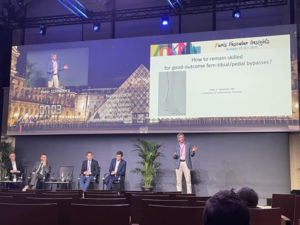
At Paris Vascular Insights (PVI) 2021 (Oct. 21–23, Paris, France), Peter Schneider, MD, University of California San Francisco, San Francisco, emphasized the need for trainees to learn both open and endovascular techniques in a talk on how to remain skilled in femorotibial/pedal bypass.
Schneider recalled that an “extremely important question” when he was a trainee was “how will we learn endovascular?” A couple of decades later, “the shoe is completely on the other foot,” he said, noting that the question now is ‘how will the trainees learn femorotibial bypass or pedal bypass and/or how will we maintain those skills?’
“Bypass is not disappearing,” the presenter declared, referring to a graph showing a downward trend but then a stabilization, at least of cases in the U.S. Instead, bypass is evolving, Schneider stated. “We are going to more distal targets, we are going after endovascular failure, and we are treating patients with worse disease morphology, and worse tissue damage in the foot.”
In addition to this evolution, Schneider noted that “we know a few things about how to get good results from bypass,” giving the example of better wound healing when there is a bypass targeting a specific angiosome.
Turning to the key question of how to remain skilled in bypass surgery, Schneider believes that this should be addressed from a programmatic standpoint that “really depends on the size of your program and the number of bypasses being done.”











